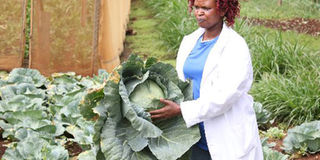We get food for all our 2,000 students from six acres

Meru Technical Training Institute farm Manager Margaret Micheni inspects one of the planted crops, on November 20 2015. Ms Micheni says an institution should endeavour to ensure that the farm project is self-sustaining. PHOTO | PHOEBE OKALL | NATION MEDIA GROUP
What you need to know:
- They keep dairy cows, pigs, grow tomatoes in 8 by 30m greenhouses, bananas, vegetables, fodder and keep fish on six acres, out of their 24.
- Principal Geoffrey Rukunja says they started the projects eight years ago after encountering difficulties feeding their about 2,000 students.
- The institution consumes 70 litres of milk every day at Sh50 per litre while the vegetables are bought at Sh10-Sh20 a kilo and a kilo of onions at Sh60.
Well-kept lawns stretch from the gate into the compound of Meru Technical Training Institute (MTTI), giving the institution a serene environment.
The government college located a few kilometres from Meru Town along the Nanyuki Road is set to be transformed into a national polytechnic, but that is not what attracted Seeds of Gold to the institution.
The school engages in various farming projects that make it tower among its peers.
They keep dairy cows, pigs, grow tomatoes in 8 by 30m greenhouses, bananas, vegetables, fodder and keep fish on six acres, out of their 24.
Principal Geoffrey Rukunja says they started the projects eight years ago after encountering difficulties feeding their about 2,000 students.
“We realised that the kitchen was gobbling up to Sh15 million of our budget. Since the institution has sufficient land, we decided to start farming to supply the kitchen. We no longer buy fresh produce from outside,” Rukunja says, adding the measures were contained in their strategic plan.
Currently, they spend about Sh6 million every year for the kitchen, which translates to Sh2 million per term.
“The farm earns us between Sh3 million and Sh4 million in profit every year. Since we started farming, we stopped complaining about finances,” says the principal, noting the institution has 21 cows, 13 which are milked, with each producing about 18 litres a day.
The school further keeps over 30 mature pigs and 130 piglets, grow bananas on half-an-acre, cabbages on an acre and rear over 1,000 fish.
Besides providing food for the institute, Rukunja says that the farm is also a training ground for students who are taking agricultural courses.
“Any learning institution that has a big population and has land should be producing its own food. The farm should be an independent department managed professionally,” he advises, noting they have employed a manager.
SELF-SUSTAINING
The farm has its own management and is a separate arm of the college, from which the institution procures all their farm produce.
At the end of the year, the farm declares profit, which is ploughed back or used in development projects.
“With a farm, we are able to provide regular jobs to the community, provide balanced diet to students and staff and make good use of kitchen waste,” Rukunja says.
Farm manager Margaret Micheni says an institution should endeavour to ensure that the farm project is self-sustaining.
Margaret, who served as an agriculture instructor at the college until January last year, says her focus is to hit Sh5 million profit from the farm.
“This being a technical training institute, we are looking into how to innovatively increase earnings. We are currently adding value to milk and we look forward to getting Kenya Bureau of Standards accreditation so that we can distribute our produce.”
She notes that the farm has six permanent workers and engages up to 14 casuals during the harvesting seasons.
“My mandate is to ensure there is continuous supply of food for the college kitchen. We supply the kitchen at highly subsidised prices compared to the market price.”
The school requires more than 80kg of onions, 1,000kg of cabbage and 1,000kg of sukuma wiki every week.
The institution consumes 70 litres of milk every day at Sh50 per litre while the vegetables are bought at Sh10-Sh20 a kilo and a kilo of onions at Sh60.
“We have nurseries for propagating the cabbage, tomatoes and sukuma wiki so that we don’t run out of seedlings.”
POULTRY PROJECT
She adds, “Excess milk is supplied to hotels at Sh60 per litre or processed into yoghurt for sale to students. Bananas earn the farm more than Sh100,000 per year.”
Solid and liquid waste that comes from the pigs and cows go to enrich the crops.
“We have installed a drainage system from the piggery and the cowsheds that directs all animal waste to the farm. The manure flows through pipes during the cleaning of the sheds.”
From all their ventures, pigs offer them the most returns. They sell two months old piglets earning over Sh1.7 million every year.
The institute gets about 700 piglets from their 30 sows every year.
“Rearing pigs in an educational institution ensures there is no wastage on the farm and in the kitchen. One pig can give birth twice a year. Most of them give birth to about 15 piglets. We sell a two months old piglet at Sh2, 500. This farm is now renowned for producing the best piglets.”
According to her, piglets earn more than mature pigs because the feeding cost is low.
On the other hand, mature pigs fetch up to Sh40,000 upon slaughter, but when the cost of feeding and care is factored in, the profit is little.
“Pigs like cooked food, quality commercial feeds and a clean environment. The sow should remain with the boar for up to seven days for conception,” she advises.
Currently, the school is working on introducing poultry for egg production and improving their dairy breeds for more milk.





